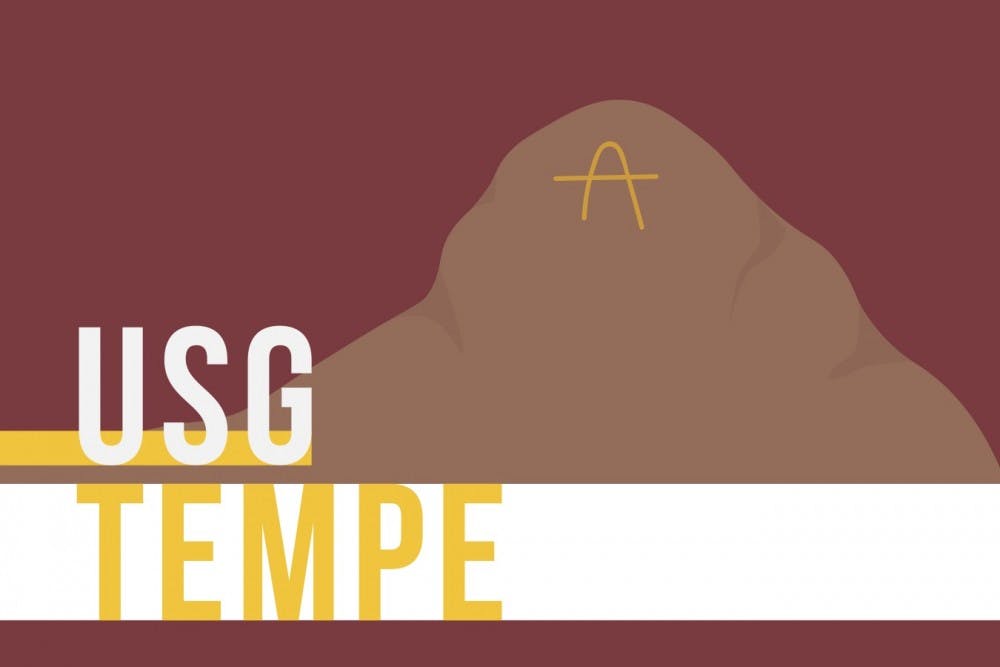Changes that Undergraduate Student Government Tempe recently made to its bylaws will modify voting procedures to be more transparent and will shorten the amount of time in advance that the senate must post meeting agendas.
The two amendments, which were passed at a USGT regular senate session on Jan. 29, will be implemented by the senate’s next regular session on Feb. 12. But some of the changes will take effect before then, such as the timing of agendas that otherwise would be published at 6:00 p.m. on Saturday under previous bylaws.
The first bill, SB 56, will allow the senate to post agendas for regular session meetings 48 hours in advance, compared to the previous requirement of 72 hours in advance.
Agendas allow the public to see what will be discussed at senate meetings, and they include legislation that will be introduced to the senate and any appointments requiring senate approval.
The rule change is attributed to previous incidents during the fall semester when the senate failed to post the required materials to its public Google Drive folder before the 72-hour deadline. Posting the agendas is a move intended to facilitate transparency with ASU students.
Read more: USG almost got sued – here's why and USG Tempe broke their bylaws, again
Senator Ryan Magel, a junior majoring in political science, was the one to introduce the bill to the USGT senate. Magel said he hopes that it will allow for the agendas to be published on time.
“Prior to this change, the Tempe campus had the longest required time for posting agendas for senate meetings at 72 hours,” he said in an emailed statement. “This lead to many problems at the start of the academic year where the senate president was unable to make the agenda available in this time frame.”
The amendment also created an official procedure for suspending a rule that voided any actions the senate took on items not included on the agenda.
In previous meetings, the senate sometimes informally suspended the rule to act on items that weren't on the agenda.
Now, with a two-thirds majority vote, senators can formally vote to suspend the rule to discuss such items.
Magel said in an email that he included the provision to give the senate a chance to respond to any last minute circumstances that may arise.
“It also allows for us in emergency situations to suspend this rule so if there is a matter that is important to the student body, we will be able to respond to it quicker,” Magel wrote.
However, Senator Kyle Cloud, a senior majoring in electrical engineering, said he opposed the amendment due to concerns that the provision could be abused and that it sets a dangerous precedent.
“To allow the senate to suspend its obligation to inform its constituency of its proceedings is to proclaim that the students enjoy no right to such information,” Cloud said in an emailed statement. “Transparency becomes a privilege to be granted or withheld at the government's pleasure.”
Magel said he doesn't share the same worries.
“I trust that the students of ASU will vote for senators who are trustworthy and have good character,” he said in an emailed statement.
The senate ultimately passed the bill with a vote of 11 in favor and one in opposition.
The other bill that was passed, SB 57, mandates that senators' votes be hidden until they have been recorded by the senate president.
“Senators have been influenced by others in the process of voting,” Magel, who sponsored the amendment, said in an emailed statement. “Senators must feel comfortable voting in a way that represents their constituents beliefs and what is best for the students.”
Previous voting procedures involved USGT senators casting their vote on the work messenger app Slack, which allowed other senators to see how their peers voted and gave them room to change their vote before it was recorded.
"Currently we have it where (senators) don't even motion, they just click something," USGT Senate President Joshua Blinkoff, a senior majoring in business law and management, said during deliberation of the amendment on Jan. 29.
Blinkoff did not respond to requests to comment by the release of this article.
To change a vote going forward, senators will be required to make a motion stating that they would like to change their vote and explain their reasoning.
The amendment will also require the secretary of the senate to publish the voting record on each legislation as part of the minutes, allowing the public to see how each senator voted.
“This forces the senate executive team to be more transparent and ensure that the student body knows what their elected officials are voting for,” Magel said in an emailed statement.
The amendment was passed with a vote of 10 in favor and two in opposition, with the details of the new voting system yet to be worked out.
While the intention of the amendments may be to increase transparency, it is ultimately up to the senate to continually uphold this commitment and continue to reach out to its constituents, said Jackson Dangremond, a senior majoring in health innovation and former USG Downtown president.
"On paper the new bylaw changes should help increase transparency," Dangremond said in a statement given over text. "The biggest challenge is ensuring the (organization) follows their own bylaws/rules."
Reach the reporter at krquaran@asu.edu and follow @kiaraquaranta on Twitter.
Like The State Press on Facebook and follow @statepress on Twitter.




